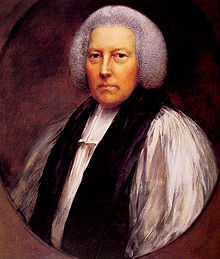Richard Hurd (clergyman)
| Richard Hurd | |
|---|---|
| Bishop of Lichfield and Coventry and Worcester | |

Bishop Hurd, as painted by Thomas Gainsborough.
|
|
| Personal details | |
| Born | 1720 Congreve, Penkridge, Staffordshire |
| Died | 28 May 1808 (aged 88) Hartlebury Castle, Worcestershire |
| Buried | Hartlebury churchyard |
| Denomination | Church of England |
| Parents | John Hurd (1685–1755) and Hannah Hurd (c. 1685–1773). |
| Alma mater | Emmanuel |
Richard Hurd (13 January 1720 – 28 May 1808) was an English divine and writer, and bishop of Worcester.
He was born at Congreve, in the parish of Penkridge, Staffordshire, where his father was a farmer. He was educated at Brewood Grammar School and at Emmanuel College, Cambridge. He took his B.A. degree in 1739, and in 1742 he proceeded M.A. and became a fellow of his college. In the same year he was ordained deacon, and given charge of the parish of Reymerston, Norfolk, but he returned to Cambridge early in 1743. He was ordained priest in 1744. In 1748 he published some Remarks on an Enquiry into the Rejection of Christian Miracles by the Heathens (1746), by William Weston, a fellow of St John's College, Cambridge.
He prepared editions, which won the praise of Edward Gibbon, of the Ars poetica and Epistola ad Pisones (1749), and the Epistola ad Augustum (1751) of Horace. A compliment in the preface to the edition of 1749 was the starting-point of a lasting friendship with William Warburton, through whose influence he was appointed one of the preachers at Whitehall in 1750. In 1765 he was appointed preacher at Lincoln's Inn, and in 1767 he became archdeacon of Gloucester.
In 1768, he proceeded D.D. at Cambridge, and delivered at Lincoln's Inn the first Warburton lectures, which were published later (1772) as An Introduction to the Study of the Prophecies concerning the Christian Church. He became bishop of Lichfield and Coventry in 1774, and two years later was selected to be tutor to the prince of Wales and the duke of York. In 1781 he was translated to the see of Worcester. He lived chiefly at Hartlebury Castle, where he built a fine library, to which he transferred Alexander Pope's and Warburton's books, purchased on the latter's death.
...
Wikipedia
